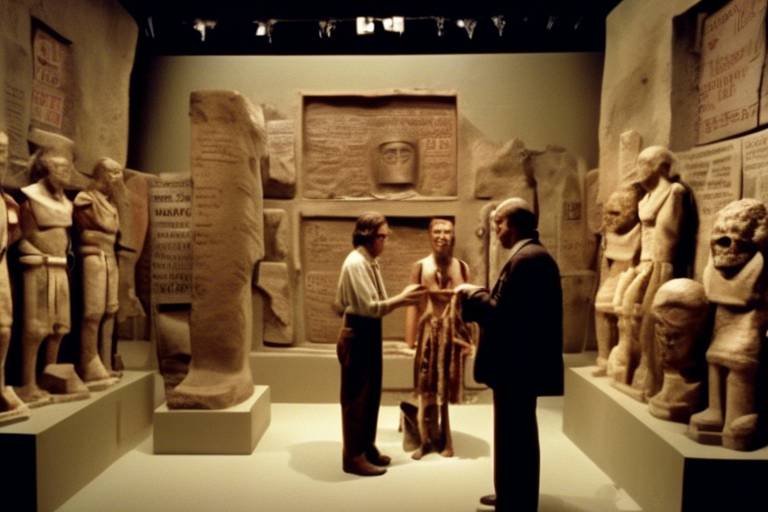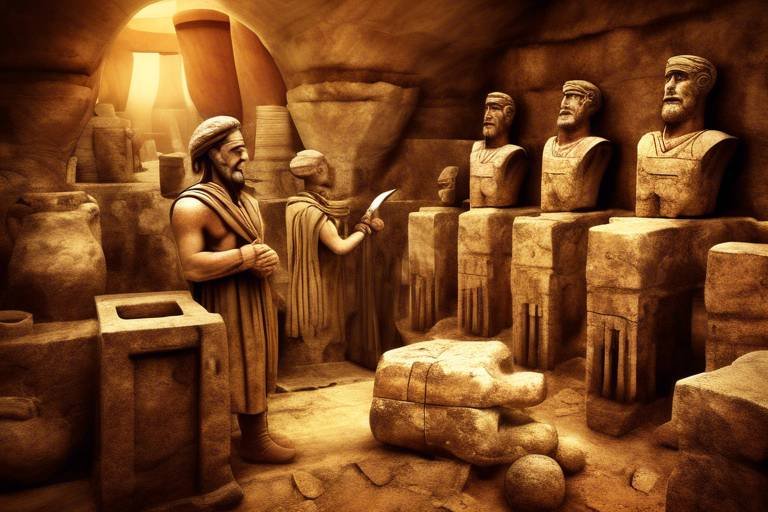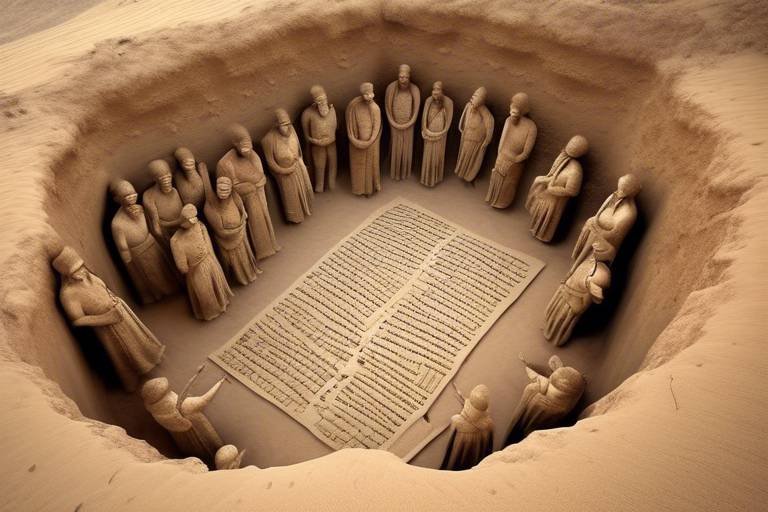The Impact of the Roman Empire on Modern Society
The Roman Empire's legacy continues to influence modern society in various ways, from language and law to architecture and government structures. Understanding these impacts sheds light on how ancient civilizations shape our contemporary world.

Language and Literature
Language and literature have always been powerful tools for connecting people across time and space. The influence of the Roman Empire on modern languages is undeniable, with Latin serving as a foundation for many contemporary languages such as English, French, and Spanish. The legacy of Latin can be seen in everyday vocabulary, legal terminology, and scientific nomenclature, highlighting the enduring impact of ancient Rome on our linguistic landscape.
Moreover, Roman literature has left an indelible mark on the literary world, with works by renowned authors like Virgil, Ovid, and Cicero still being studied and celebrated today. Their writings explore universal themes of love, power, and morality, resonating with readers across centuries. The rich storytelling tradition of the Romans has influenced subsequent generations of writers, inspiring new narratives and literary techniques.
By delving into Roman literature, readers can uncover insights into ancient society and human nature, gaining a deeper appreciation for the complexities of the past. The enduring popularity of Roman myths and legends, from the epic tales of gods and heroes to the tragic love stories of mortals, speaks to the timeless appeal of these narratives and their relevance in contemporary culture.

Legal Systems
The Roman legal system, with its emphasis on justice, equality, and the rule of law, has left an indelible mark on modern legal frameworks. Rooted in principles that valued fairness and accountability, Roman law laid the groundwork for many legal concepts that are still prevalent today. The idea of innocent until proven guilty, a cornerstone of modern justice systems, finds its origins in Roman jurisprudence.
Furthermore, the Roman legal system introduced the concept of legal precedent, where previous court decisions serve as a guide for current cases. This practice of looking to past rulings for guidance is a fundamental aspect of many contemporary legal systems, ensuring consistency and predictability in the application of the law.
One of the key contributions of Roman law to modern society is the development of contracts and property rights. The Romans created a system that recognized and protected individuals' rights to own property and enter into agreements, establishing a framework for economic transactions that continues to underpin commercial law today.
In addition to these foundational elements, Roman legal principles also influenced the structure of legal institutions. The Roman concept of magistrates and judges overseeing legal proceedings set the stage for the establishment of independent judiciary systems in many countries. The idea of impartial adjudicators responsible for interpreting and applying the law impartially can be traced back to the Roman legal tradition.

Architecture and Engineering
Roman architecture and engineering stand as a testament to the ingenuity and innovation of the ancient civilization. The grandeur of structures like the Colosseum and the Pantheon continues to awe and inspire architects and engineers worldwide. The Romans excelled in creating monumental buildings that not only served practical purposes but also symbolized their power and influence.
One of the remarkable aspects of Roman engineering was their mastery of aqueducts, which allowed for the efficient transport of water across vast distances. These aqueducts not only supplied water to cities but also facilitated the development of urban centers and public baths. The engineering prowess displayed in the construction of these aqueducts remains a marvel of ancient engineering.
Roman roads are another enduring legacy of their engineering expertise. The extensive network of roads built by the Romans facilitated communication, trade, and military conquests. The straight, well-built roads not only connected distant parts of the empire but also served as a symbol of Roman authority and efficiency.
Moreover, the Romans were adept at constructing durable bridges that withstood the test of time. The engineering principles employed in Roman bridge construction, such as the arch and the use of concrete, have influenced bridge design for centuries. The durability and functionality of Roman bridges highlight their advanced understanding of engineering principles.
Overall, Roman architecture and engineering continue to influence modern construction practices and architectural design. The legacy of their monumental structures, innovative engineering solutions, and enduring infrastructure serves as a reminder of the lasting impact of the Roman Empire on the built environment.

Government and Politics
The Roman model of government was a complex system that heavily influenced modern political structures. At the core of Roman governance was the concept of a republic, where power was divided among different branches to prevent any single individual from becoming too powerful. This idea of checks and balances can be seen in many modern democracies, where branches of government serve as watchdogs over each other to ensure accountability and prevent abuse of power.
In addition to the division of powers, the Romans also valued the participation of citizens in the political process. The idea of citizenship, with rights and responsibilities, was central to Roman society. This emphasis on civic duty and engagement laid the foundation for modern notions of democracy and representation. The Roman Senate, a governing body composed of elected officials, served as a forum for debate and decision-making, similar to modern parliaments and congresses.
Furthermore, the Roman legal system played a crucial role in shaping modern legal principles. Concepts such as the rule of law, equality before the law, and the presumption of innocence can be traced back to Roman jurisprudence. The development of legal codes and the establishment of courts for resolving disputes were key contributions of the Roman legal system that continue to influence legal systems worldwide.

Religion and Mythology
Religion and mythology played a significant role in shaping the cultural landscape of the Roman Empire. The Romans were polytheistic, worshipping a pantheon of gods and goddesses with intricate mythologies and rituals. These religious beliefs permeated all aspects of Roman life, influencing art, literature, and governance.
One of the most prominent features of Roman religion was the incorporation of deities from other cultures into their pantheon. This syncretism allowed the Romans to adapt and integrate foreign gods into their belief system, creating a diverse and inclusive religious environment. For example, the Greek gods were often equated with their Roman counterparts, leading to a blending of mythologies.
The Roman mythological stories, passed down through generations, provided moral lessons and explanations for natural phenomena. Myths such as the founding of Rome by Romulus and Remus or the tales of gods like Jupiter, Venus, and Mars were not only entertaining but also served as a way to understand the world and human behavior.
Religious practices in ancient Rome were deeply intertwined with daily life, with ceremonies, festivals, and sacrifices conducted to honor the gods and ensure their favor. The Roman calendar was filled with religious holidays and observances, reflecting the importance of spirituality in Roman society.
Moreover, the influence of Roman religion and mythology extended beyond the borders of the empire, leaving a lasting impact on art, literature, and architecture in the Western world. Many Renaissance artists drew inspiration from classical myths and themes, infusing their works with references to Roman gods and legends.
In contemporary culture, references to Roman mythology abound in various forms of media, from literature and films to video games and advertising. The enduring popularity of characters like Hercules, Venus, and Mercury demonstrates the timeless appeal of these ancient stories and figures.

Social Hierarchies and Class Structures
When examining the impact of the Roman Empire on modern society, one cannot overlook the significant influence it has had on social hierarchies and class structures. The Roman Empire was characterized by a rigid social hierarchy, with clear distinctions between the upper class, the middle class, and the lower class. This division of society based on wealth, status, and power has left a lasting legacy that continues to shape contemporary social dynamics.
At the top of the Roman social hierarchy were the aristocrats and elite, including senators, wealthy landowners, and high-ranking officials. These individuals enjoyed privileges, wealth, and influence, often inherited through generations. Their positions in society were marked by luxury, political power, and access to education and culture.
In the middle of the social pyramid were the common citizens, comprising merchants, artisans, and small landowners. While they had more rights and opportunities than the lower class, they were still subject to the authority and dominance of the elite. The middle class played crucial roles in trade, craftsmanship, and urban life, contributing to the economic and cultural vibrancy of Roman society.
At the bottom of the social hierarchy were the slaves and the impoverished, who had little to no rights or social mobility. Slavery was a fundamental institution in the Roman Empire, with slaves performing laborious tasks in households, mines, and farms. The lower class struggled to survive, facing exploitation, poverty, and limited prospects for advancement.
The legacy of these social hierarchies and class structures can be seen in modern societies, where disparities in wealth, power, and opportunities persist. The echoes of Roman social divisions can be found in contemporary issues such as income inequality, social mobility, and the concentration of power in the hands of a few.
By examining the social structures of the Roman Empire, we can gain insights into the complexities of modern society and the ongoing challenges of creating a more equitable and inclusive world. The lessons of history remind us of the importance of addressing social inequalities and striving for a fairer and more just society for all.

Education and Philosophy
Education and philosophy were integral parts of Roman society, shaping the minds of individuals and influencing the intellectual landscape of the empire. In Roman educational practices, emphasis was placed on rhetoric, the art of persuasive speaking and writing, which was considered essential for success in public life. Students were trained in the art of argumentation and debate, honing their skills in communication and persuasion.
Furthermore, Roman philosophy played a significant role in guiding ethical and moral principles. Philosophers like Seneca and Cicero explored questions of virtue, justice, and the nature of the self, providing insights that continue to resonate in modern philosophical discourse. Their writings delved into the complexities of human existence, offering wisdom that transcends time and cultural boundaries.
Through the study of philosophy, Romans sought to understand the fundamental truths of the universe and their place within it. Concepts such as stoicism and epicureanism offered different paths to achieving a good and meaningful life, encouraging individuals to reflect on their values and beliefs.
Moreover, Roman education extended beyond rhetoric and philosophy to encompass a wide range of subjects, including literature, mathematics, science, and history. Students were exposed to diverse fields of knowledge, fostering a well-rounded education that cultivated both intellectual and practical skills.
Overall, education and philosophy in ancient Rome served not only to impart knowledge but also to cultivate critical thinking, moral reasoning, and a deeper understanding of the world. The legacy of Roman educational practices and philosophical insights continues to shape modern educational systems and intellectual pursuits, highlighting the enduring relevance of ancient wisdom in today's society.

Trade and Economy
The Roman Empire's impact on trade and economy was profound, shaping the foundation of modern global commerce. The Romans established extensive trade networks that connected distant regions and facilitated the exchange of goods, ideas, and culture. These networks not only boosted economic growth but also fostered cultural exchange and innovation.
One of the key contributions of the Roman Empire to the economy was the development of a standardized currency system. The introduction of coins made trade more efficient and reliable, laying the groundwork for modern monetary systems. Roman coins, with their intricate designs and inscriptions, became symbols of economic power and stability.
Moreover, the Romans pioneered the concept of markets as central hubs for commercial activities. Marketplaces in Roman cities bustled with merchants selling a variety of goods, from food and clothing to luxury items. These vibrant markets not only fueled economic prosperity but also served as social gathering places where people exchanged not just goods but also ideas and information.
Additionally, the Roman Empire's extensive road network played a crucial role in facilitating trade and transportation. The construction of well-maintained roads enabled goods to be transported quickly and efficiently across vast distances, connecting far-flung regions of the empire and beyond. These roads not only boosted trade but also facilitated the movement of people, fostering cultural exchange and interaction.
Furthermore, the Romans developed sophisticated trade routes that stretched from Europe to Asia, linking diverse regions and facilitating the exchange of commodities such as spices, silk, and precious metals. These trade routes not only enriched the Roman economy but also contributed to the spread of ideas, technologies, and cultural practices across continents.
Frequently Asked Questions
- How did the Roman Empire influence modern languages?
The Latin language, spoken by the Romans, has left a significant mark on modern languages such as English, French, and Spanish. Many words and phrases in these languages have roots in Latin, showcasing the enduring impact of the Roman Empire on linguistic evolution.
- What legal principles originated from Roman law?
The Roman legal system introduced foundational principles like justice, equality, and the presumption of innocence until proven guilty. These concepts form the basis of many modern legal systems, emphasizing the importance of fairness and due process.
- How did Roman architecture influence modern building designs?
Roman architecture, known for its grand structures like the Colosseum and aqueducts, has served as a source of inspiration for architectural styles worldwide. Elements such as arches, columns, and domes continue to influence contemporary building designs and construction techniques.
- What political concepts can be traced back to ancient Rome?
Ancient Rome's governmental model, characterized by divisions of power, checks and balances, and citizen representation, laid the groundwork for modern political systems. Ideas like democracy, republicanism, and civic duty find their roots in the governance structures of the Roman Empire.
- How did Roman mythology impact modern culture?
Roman religious beliefs and mythological stories have permeated various aspects of modern culture, influencing art, literature, and entertainment. References to Roman gods and goddesses can still be found in contemporary works, showcasing the enduring legacy of ancient mythological traditions.



















